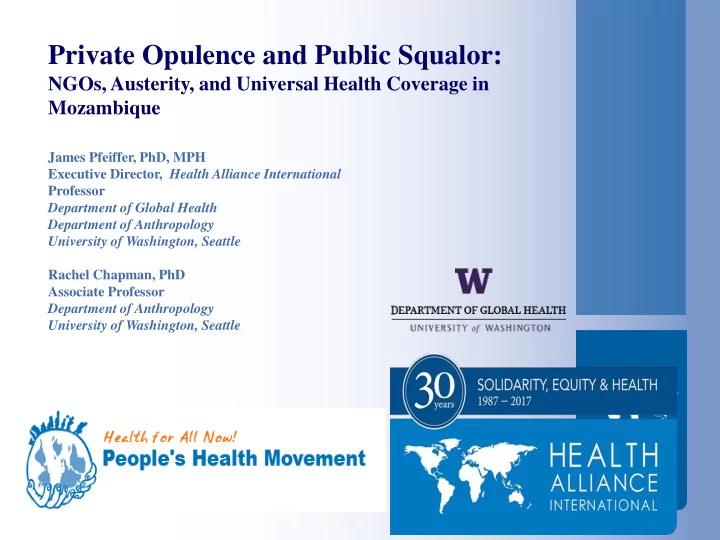

Private Opulence and Public Squalor: NGOs, Austerity, and Universal Health Coverage in Mozambique James Pfeiffer, PhD, MPH Executive Director, Health Alliance International Professor Department of Global Health Department of Anthropology University of Washington, Seattle Rachel Chapman, PhD Associate Professor Department of Anthropology University of Washington, Seattle
SDG 3 and UHC 3.8 Achieve universal health coverage, including financial risk protection, access to quality essential health-care services and access to safe, effective, quality and affordable essential medicines and vaccines for all. http://www.who.int/sdg/targets/en/
“UHC is firmly based on the WHO constitution of 1948 declaring health a fundamental human right and on the Health for All agenda set by the Alma Ata declaration in 1978. UHC cuts across all of the health-related Sustainable Development Goals (SDGs) and brings hope of better health and protection for the world’s poorest.” http://www.who.int/sdg/targets/en/ HEALTH ALLIANCE INTERNATIONAL (HAI)
40 th Anniversary of Alma Ata U.S. represented At Alma-Ata, we declared that health care is not just another commodity. The wealth of a nation should not determine the health of its people. Good health is not a gift to be rationed based on ability to pay. Quality, affordable health care for all people is a matter of basic fairness. Health care should be a fundamental right of every man, woman and child. At Alma-Ata, we urged the governments of the world to guarantee this right by the year 2000. HEALTH ALLIANCE INTERNATIONAL (HAI)
The Case of Mozambique SAP/PRSP 1987-present Surge in DAH in 2000s including PEPFAR 477 prime partners in FY2008 PEPFAR: $1.5 billion from 2010-16, over $3 billion total since 2004 Massive data collection demands Anemic health system growth. Where did all that money go? HEALTH ALLIANCE INTERNATIONAL (HAI)
Percentage of PEPFAR funding by type of prime partner in 13 PEPFAR partner countries Evaluation of PEPFAR Committee on the Outcome and Impact Evaluation of Global HIV/AIDS Programs Implemented Under the Lantos-Hyde Act of 2008; Board on Global Health; Board on Children, Youth, and Families; Institute of Medicine. Washington (DC): National Academies Press (US); 2013 Jun 27. HEALTH ALLIANCE INTERNATIONAL (HAI)
Mozambique Health Sector Financing 2009-2015 HSSP Financing deficit HEALTH ALLIANCE INTERNATIONAL (HAI)
PEPFAR: The Scramble for Africa HEALTH ALLIANCE INTERNATIONAL (HAI)
HEALTH ALLIANCE INTERNATIONAL (HAI)
Staff, Stuff, Space & Systems “Eighty -two percent of Mozambicans live on less than two dollars per day. With limited health infrastructure, more than half of all Mozambicans walk over one hour to reach the nearest health facility. Health facilities face frequent commodity stock outs and a general dearth of basic amenities: 55 percent lack electricity and 41 percent lack running water. Likewise, human resources for health (HRH) are severely constrained in Mozambique. With only five doctors and 24 nurses per 100,000 population, and 429 social workers in the country, Mozambique faces some of the most critical HRH shortages in the world. There are an inadequate number of trained and competent health care workers in all cadres, including an uneven geographic distribution of health providers, which are often poorly trained and have limited supervision. The Government of Mozambique’s capability to oversee its policies and regulations and to coordinate all health actors is weak, resulting in poor overall supervision and coordination. Information systems and monitoring and evaluation efforts are generally unable to provide timely and accurate health system data .” OGAC PEPFAR Fiscal Year 2016 Congressional Budget Justification Supplement HEALTH ALLIANCE INTERNATIONAL (HAI)
HEALTH ALLIANCE INTERNATIONAL (HAI)
Recommend
More recommend